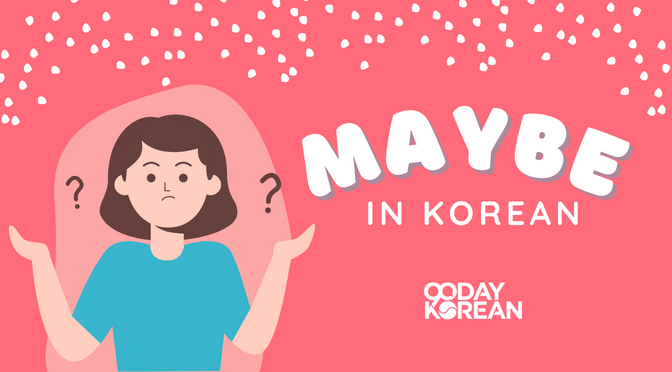Yes is 네 (ne), and no is 아니요 (aniyo), but do you know how to say “maybe” in Korean yet? If your answer to this just so happens to be “maybe,” or perhaps even “no,” then this is the lesson for YOU!
Today you’ll learn the ways how to say “maybe” in Korean and whatever using that word can bring about for you. Just maybe this is the word to jumpstart your Korean language learning journey. Get your notebook and pen ready, and let’s get going!
Contents
“Maybe” in Korean
Although there are several different ways to say “maybe,” there are three main words to use to describe it directly and generally. The first word to use is 아마 (ama), the second word to use is 아마도 (amado), and the third word to use is 어쩌면 (eojjeomyeon), all of which are interchangeable with each other.
If you want to say “maybe” with the meaning of “by any chance” (as in “can you maybe help me with this?), then using the Korean equivalent of 혹시 (hokshi) is the way to go. In turn, if you’re using the word “maybe” with the connotation of “I wouldn’t know” or leaning towards the negative (as in “Maybe that’s the answer, maybe it isn’t”) then you should say 글쎄요 (geulsseyo).
For example:
혹시 그 파티에 같이 갈래? (Hokshi geu patie kachi gallae?)
By any chance, wanna go to that party together?
글쎄, 그 약속이 아직 확실한지 모르겠네. (Geulsse, geu yaksoki ajik hwakshilhanji moreugettne.)
I wouldn’t know, that appointment hasn’t been finalized yet.
How to say “Maybe” in Korean
The Korean words for “maybe” can be used in two ways. You can either use them as a reply or in sentences when you’re not sure about something but you’re making a guess about it.
Here’s an example when using it as a reply:
A: 그 파티에 갈 거예요? (geu patie gal geoyeyo?)
Are you going to the party?
B: 아마도요. (amadoyo)
Maybe.
Below are examples when making a guess about something you are unsure of:
아마 내일 다시 비가 올 거에요. (Ama naeil dashi biga ol geoeyo.)
Maybe it will rain again tomorrow.
아마도 여섯시까지 일을 다 마무리할 수 있을 거예요. (Amado yeoseossikkaji ireul da mamurihal su isseul goyeyo.)
Maybe I can finish all of my work by 6.
어쩌면 나도 갈지 몰라요. (eojjeomyeon nado galji mollayo.)
Maybe I’ll go, too.
“Probably” in Korean
The word “probably” in Korean can be expressed with the words 아마 (ama) and 아마도 (amado). Both words are casual versions. You can use 아마도요 (amadoyo) if you want the polite version.
For example:
아마 좋아하게 될 거예요. (ama joahage doel geoyeyo.)
You’ll probably like it.
아마도 카페에 갔을 것이다. (amado kapee gasseul geosida.)
He probably went to the cafe.
“Perhaps” in Korean
“Perhaps” in Korean can be expressed with the same words used for “maybe.” You can use 아마 (ama), 아마도 (amado), or 어쩌면 (eojjeomyeon) for “perhaps” in Korean.
For example:
제가 아마도 도울 수 있을 거에요. (jega amado doul su isseul geoeyo. )
Perhaps I can help.
이것은 아마 지금까지 나온 그의 소설 중 최고일 것이다. (igeoseun ama jigeumkkaji naon geuui soseol jung choegoil geosida.)
This is perhaps his best novel to date.
어쩌면 그가 한 말이 모두 사실일지도 몰라. (eojjeomyeon geuga han mari modu sasiriljido molla.)
Perhaps everything he said was true.
A word of caution about Romanization
While it is possible for you to study the words in this article simply by reading their romanized versions, it will come in handy for you to be able to read Hangeul if you ever wish to come to Korea. Hangeul is the Korean alphabet, and not difficult to learn. In fact, you can learn it in just 90 minutes.
After you’ve familiarized yourself with Hangeul, life in Korea will suddenly seem so much easier, and the country won’t appear so foreign to you. So, if you’re serious about learning Korean, why not learn Hangeul today?
Wrap Up
Maybe, just maybe, you now know how to say “maybe” in Korean? We’d love for you to show us your mad skills! What word would you like to learn next? Let us know in the comments below, and maybe your choice will be our next article!






It’s interesting that you provided the same Korean words for maybe and probably. These have different meanings in English. I think most people would say maybe is about 50% whereas probably is about 75%. Is there no distinction in Korean?
Hi Wade! There is no distinction in Korean like there is in English. The same word – 아마 or 아마도 – can be used for both “maybe” and “probably”. ^^
안녕하세요?
quick question from a learner, how do i say “maybe, maybe not” in korean? The example in my situation is like:
Friend: do you like somebody?
Me: maybe, maybe not!
감사합니다!
Hi, You can say “그럴 수도 있고 아닐 수도 있어!” for “maybe, maybe not!”
안녕하세요
How would I say: “Maybe, maybe not” implying the same meaning as “who knows?”
E.g. After a colleague misses a week of work.
A: Is she coming to work this week?
B: Who knows? #shrugs
감사합니다
수고하세요!!
Hi EmMo! You can say “그럴 수도 있고, 아닐 수도 있고” for “maybe, maybe not.” To put it simply though, you can also say “글쎄” for “who knows?” ^^
감사합니다
천만에요 ^^ Thanks for the comment, Rath!